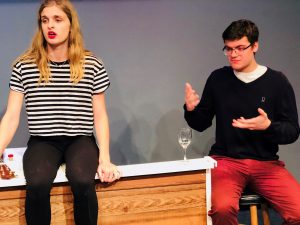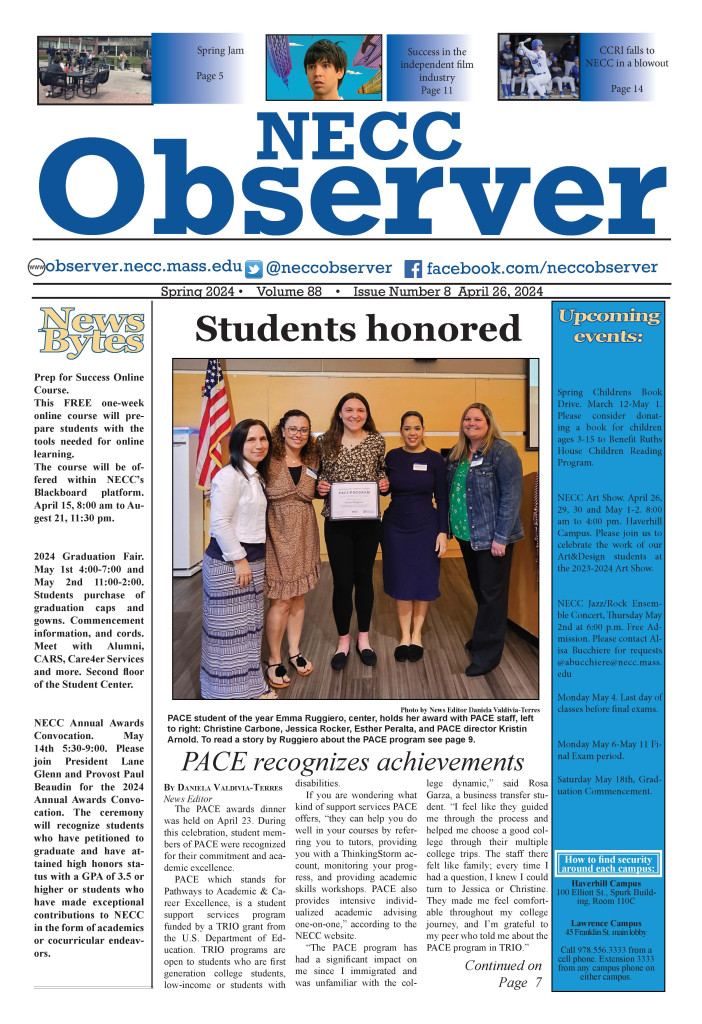Gwynnethe Glickman awarded “Distinguished Performance in a Play” award from theater fest
NECC student Gwynnethe Glickman has received the “Distinguished Performance in a Play” award from the Kennedy Center American College Theater Festival (KCACTF) for her portrayal of Mash in NECC’s production of Stupid F*cking Bird by Aaron Posner. The production was chosen by the KCACTF to be showcased at is annual regional theater festival in Hyannis, Mass. and was performed there in January, according to Stupid F*cking Bird co-director Brianne Beatrice. According to the Facebook account of KCACTF Region 1 (the KCACTF showcase in which selected Northeastern U.S, colleges perform), the title Glickman won is a national award, and only three other actors in Region 1 received it.

However, the KCACTF is only one of several sources which say Glickman is a talented, hardworking and influential performer; Stupid F*cking Bird’s other co-director Sarah Durning, Newburyport-based actress Vanessa Romaides and Brianne Beatrice all express great admiration and appreciation for Glickman’s acting: an acting style Glickman says is based on improvisation, physicality, and honest communication with other actors and the audience.
Glickman, who has been acting since she was in elementary school, says that her method for acting varies with each character she portrays, but that, when playing Mash, she tried to fall into the role and to be as empathetic toward her character, whom Glickman describes as moody and sarcastic, as possible: “I felt like I knew her so well … The way I interacted with people (outside of the show) changed because of Mash. My sarcasm and cynicism were heightened because of her.”
In addition to the empathy she has for her characters, Glickman also draws on her own experiences to make performances organic and honest for audiences. She says she does this especially in darker scenes, since she finds it more difficult to portray darker (emotions she says she feels much less often than lighter feelings): “I think portraying happy, middle-ground characters is a lot easier than when you have to be sad. I like to pull from dark places because I want to feel for the character. I don’t want to just pretend I’m really sad.”
Yet while Glickman says the work an actor does with his or her individual self is important, she stresses that the most important, and some of the more difficult, work actors do in productions is with the rest of the cast: “Ideally you want it to be a communal experience where the cast is exploring together. I think it’s harder to do that work than it is to do the individual work.”
Glickman, along with her explanation of her acting style, is also offering advice to other actors. This advice includes ways she thinks it is effective to deliver lines and how to avoid falling prey to the self-scrutiny actors, according to Glickman, often experience. Glickman says that “The work actors do is based upon judgement. We go out on stage and constantly subject ourselves to judgement… Just try not to care about “messing up” or saying something “right.” Something I’m always working on is not caring. How you do stuff right is you mess up and sound like an idiot and explore methods that definitely won’t work so you can find ways that definitely will work.” The last piece of advice Glickman gives is to try to use physicality as much as possible when portraying a character. She says, simply but memorably, “When in doubt, move.”
But are these techniques effective? Other actors in the community vehemently say, “Yes.” Brianne Beatrice has described Glickman as “incredibly talented” and has said that, “She has no idea how good she is.” Sarah Durning expresses similar thoughts. Durning says that she sees Glickman as an influential and impactful performer: “I auditioned with her for The Odd Couple (a play put on by NECC before Stupid F*cking Bird), so I knew she was really good and I was like, “Oh, wow.” I really noticed her. So when she auditioned for Stupid F*cking Bird I was like, “Yes!””
Durning describes Glickman as “a lot of fun” to work with, and says that she is not afraid to own the stage: “I loved working with her. She’s very good with her body. She’s very good with owning the stage … Sometimes I wouldn’t know how to block her and she would just start moving around … I was like, “You can keep that.” Durning also admires Glickman’s passion and improvisational techniques, stating, “Her character, I think, broke the fourth wall more than any other character. (In theater, the fourth wall is the imaginary barrier between actors and the audience.) She was singing with the audience … She would often have to go off script and improv with the audience … I didn’t have to break her out of any kind of shell. I was like, “Just go around the stage and blow up,” and she would do it.”
But Glickman is, to Durning, not only a fantastic actor to direct but also a special performer to watch: “She just pops. She’s so unique and she catches a lot of eyes … I always loved watching her interact with the audience. She would do something different every night … During the first performance at festival, the ukulele wasn’t tuned, so she had to improvise and started clapping and singing. She got everyone to clap. That’s theater. Stuff like that happens and it’s live theater and you’re never going to see that again. She embodies that, doing something different every night. She inspires me to come out of my shell more.”
Vanessa Romaides is also inspired by Glickman. Romaides, who went to elementary school with Glickman and has acted with her in, Romaides says, at least seven shows, expresses that working with Glickman makes acting in a scene relatively easy: “When I’m with her I’m in the scene, you know? With certain people that I work with I feel like it’s hard to stay in character and that character integrity a problem because they aren’t the character. But Gwynne is the character. I’m in the world that we as performers have created, and the rest of the world doesn’t exist. When I’m with her, I’m not myself. I’m not Vanessa; Gwynne is not Gwynne. We are our characters.”
Romaides believes she has learned valuable lessons from Glickman, and says, “She is definitely one of the performers I look up to … She has no set type and she’s very versatile … She also experiments a lot with text, and, unlike a lot of actors, doesn’t have one set way of delivering lines. She lets it all out and she doesn’t care. I learned from her that I should give it 110 percent.”

